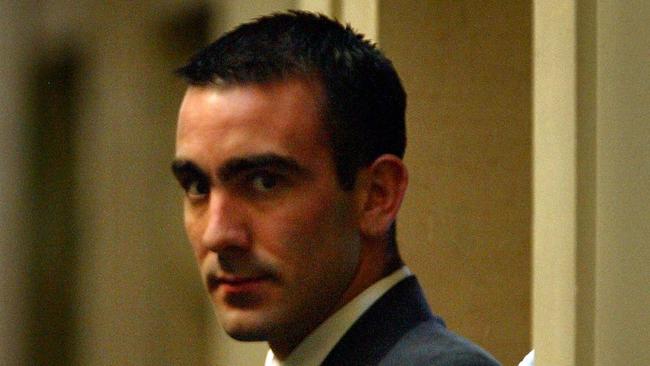How a single document quashed Roberts’ conviction
The single document that quashed Jason Roberts’ conviction over the Silk-Miller murders would still be buried if it weren’t for a brave whistleblower, writes Anthony Dowsley.

The quashing of Jason Roberts’ convictions over the Silk-Miller police murders came down to a single document.
The document would still be “buried” had it not been for a brave whistleblower.
The Herald Sun’s interest in Roberts’ conviction began after it learned the 1998 killings had been the subject of a police reinvestigation — dubbed Rainmaker — in 2012.
It probed Roberts’ claims of an alibi, backed by his ex-girlfriend, Nicole Debs.
Roberts’ allegation was that his armed robbery mentor, Bandali Debs, was the lone shooter.
But his case would stagnate for years.
In 2015, more evidence came to light when ex-homicide detective Ron Iddles, who headed Rainmaker, was told by an ex-officer he had made two statements about the “dying declaration’’ of murdered police officer Rodney Miller, who was shot alongside his police partner, Sgt Gary Silk, during a stake-out in Moorabbin.
The ex-officer was Glenn Pullin, who had been one of the first responders who spoke to a dying Sen Constable Miller.
But only one of Mr Pullin’s statements made it on to the police brief of evidence.
Significantly, it implied two offenders, and strengthened other statements that relied on Mr Pullin’s.
The state’s anti-corruption body IBAC was told, but could not substantiate the claims.
Subsequently, then attorney general Martin Pakula denied Roberts’ petition for mercy.
Mr Pakula did so despite engaging top barrister David Grace QC to give him independent advice, which recommended sending Roberts back to court.
But Mr Pakula ignored it. Instead he requested, and relied upon, a submission from Victoria Police to deny Roberts’ petition.
The potted history of Roberts’ battle to be granted an appeal was all but over.
Five years of stories published in the Herald Sun exposing secret police and anti-corruption investigations, however, yielded enough interest for a breakthrough.
It led to someone coming forward to the newspaper in 2017, possibly unaware of the importance of the documentation in their possession.
One of the documents was officer Pullin’s original police statement, made on the morning of the Silk-Miller murders on August 16, 1998.
Your author was already in possession of the statement Mr Pullin had testified to in the 2001-2002 court hearings.
But holding the statements up side by side, there were lines of evidence added, and it was backdated to appear as an original. It proved a corruption.
Two police statements made and signed at precisely the same time cannot be legitimate.
Whistleblowers are brave and they act in the interests of justice.
Roberts stood condemned to sit in jail for life if it were not for the perseverance of a good cop, his lawyers, and a whistleblower.
His case is no longer a political football. And Victoria’s judicial system is no longer blind to the police tactics.
Roberts will now receive a fair trial sans a fabricated piece of evidence crucial to his conviction.
It would not have been granted if a single document, given to a journalist, had remained buried forever.
Anthony Dowsley is a Herald Sun crime reporter
MORE OPINION
DAN’S VIRUS RULES JUST DON’T MATCH THE THREAT
